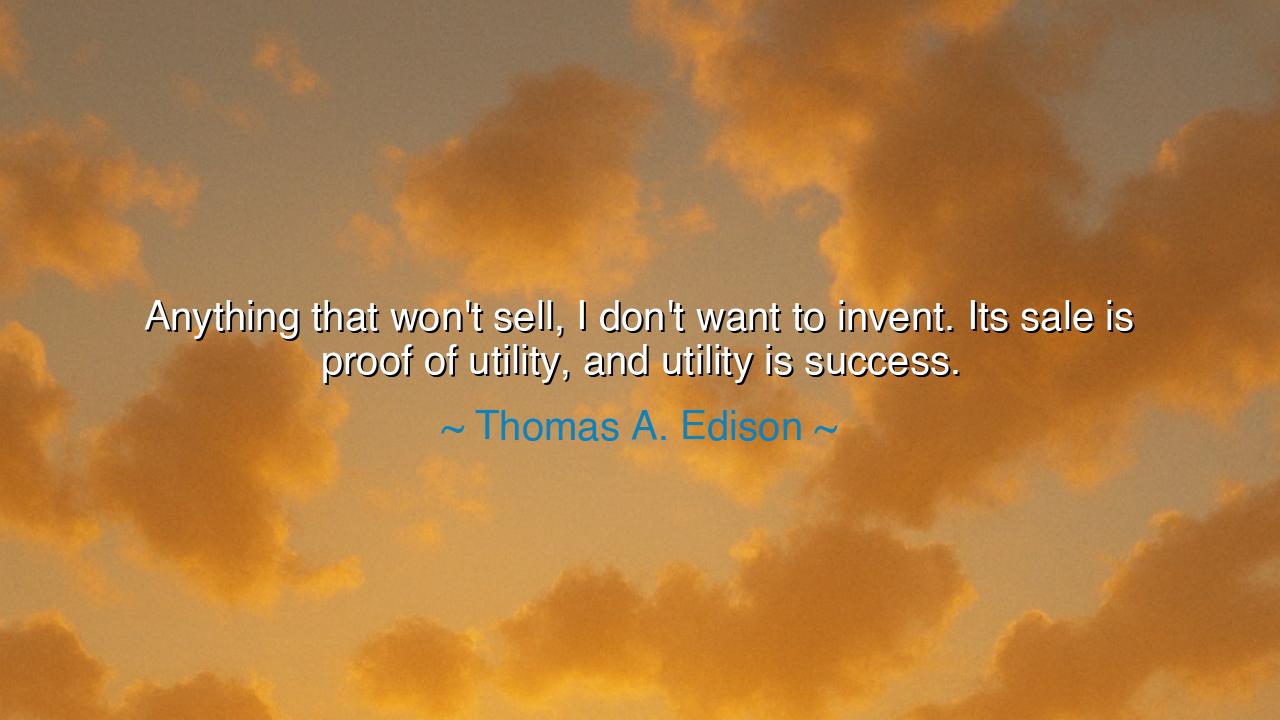
Anything that won't sell, I don't want to invent. Its sale is
Anything that won't sell, I don't want to invent. Its sale is proof of utility, and utility is success.






“Anything that won’t sell, I don’t want to invent. Its sale is proof of utility, and utility is success.” Thus spoke Thomas A. Edison, the tireless inventor, whose hands and mind brought forth the electric light, the phonograph, and countless other marvels. In these words, he reveals a principle as practical as it is profound: that invention is not merely the pursuit of cleverness, nor the indulgence of imagination, but the creation of what serves humanity. Utility is the measure, and where there is usefulness, there is true success.
The origin of this wisdom lies in Edison’s own life of relentless experimentation. He was no idle dreamer chasing fantasies without anchor. He understood that the power of invention is fulfilled only when it meets the needs of people, when it steps beyond the laboratory and enters the homes, streets, and lives of ordinary men and women. The electric light was not a toy for the curious—it was a revolution in daily life, banishing darkness and lengthening the hours of human endeavor. In this, Edison reminds us that the worth of an idea is proven not in conception but in adoption.
History has shown this same truth in many forms. Consider James Watt, whose refinement of the steam engine ignited the Industrial Revolution. Others before him had played with similar designs, but it was Watt’s ability to harness and refine the machine for broad use that made it transformative. His invention succeeded not because it was clever, but because it was useful—because it met the urgent demands of society. Here, as with Edison, we see that the proof of greatness is not in the brilliance of thought alone, but in the practical service of that thought to the world.
And yet, Edison’s words are not a dismissal of imagination. They are, rather, a discipline for imagination. The human mind can dream endlessly, but without the tether of utility, those dreams may drift into emptiness. He insists that creativity must be harnessed toward the good of mankind, toward what can be embraced, used, and integrated into life. In this, he elevates invention from mere play to a sacred duty: to shape tools that uplift humanity.
But his saying also carries a caution. In a world that often glorifies novelty for its own sake, Edison reminds us that novelty without purpose is hollow. To invent what no one needs, to labor over what brings no blessing to others, is to squander both time and genius. True greatness is not in dazzling for a moment, but in serving for generations. Thus, the sale of an invention, in his eyes, is not a shallow quest for profit—it is evidence that the invention has meaning, that it answers a cry from the human condition.
The lesson for us is clear: in all things, seek utility. Whatever you create, whatever you labor at, ask yourself—does this serve others? Does it lighten a burden, heal a wound, spark joy, or bring clarity? Do not labor only for vanity or applause, but for usefulness. For when your work is useful, it will not only sustain others, but it will sustain you, carrying your name and your legacy long after your voice has gone silent.
Therefore, let each person act with both imagination and discipline. Dream boldly, but also ask how your dream may be planted in the soil of reality. Do not despise humble utility, for it is the quiet key to enduring success. A chair well built, a word well spoken, a tool well designed—these may outlast monuments, for they serve. In service lies immortality.
So let Edison’s words endure: “Its sale is proof of utility, and utility is success.” Take them as a command to wed imagination to service, and brilliance to compassion. For in the end, the measure of your life’s work will not be in how clever it was, but in how it served, uplifted, and endured. That is true success, and that is the crown of the useful life.






AAdministratorAdministrator
Welcome, honored guests. Please leave a comment, we will respond soon